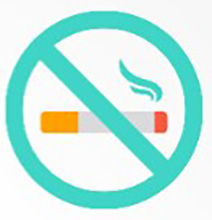In this episode of the PTSD Bytes podcast, Dr. Pearl McGee-Vincent discusses PTSD and tobacco use with Dr. Ellen Herbst.
Tobacco products and nicotine dependence
Tobacco products include cigarettes and cigars, as well as chewing tobacco (dip). Nicotine is a highly addictive substance in tobacco. Electronic cigarettes, otherwise known as e-cigarettes or vapes, do not contain tobacco but deliver nicotine by heating a liquid that contains nicotine.
Nicotine dependence is when you can’t stop using nicotine. Some signs you may be nicotine dependent are:
- Using nicotine frequently
- Using nicotine within 30 minutes of waking up
- Using more nicotine than you intended to
PTSD and tobacco use
People with PTSD are more likely to use tobacco than people without PTSD. And smokers with PTSD are more likely to be heavy smokers (20+ cigarettes per day). This is because the symptoms of PTSD may increase cravings for nicotine.
PTSD and quitting tobacco
Quitting tobacco can help your physical and mental health in the long run. If you have PTSD, you may feel like using tobacco helps alleviate stress. In reality, using tobacco may actually make PTSD symptoms worse. For example, smoking can make it harder to fall asleep. The myth that quitting smoking makes PTSD symptoms worse is not true. If you get support, especially in the first few weeks after quitting, PTSD symptoms do not get worse in the long term.
Treatments to help quit
It is normal to make multiple attempts at quitting before being successful, says Herbst. But each attempt gets you closer to success. The most effective way to quit tobacco is with a combination of medication and behavioral coaching. Behavioral coaching involves at least four sessions of a provider counseling you on strategies to quit, such as how to identify triggers.
There are several different medications to help quit. One is nicotine replacement, such as the patch plus a lozenge or gum to help when a craving hits. These can be purchased over the counter or obtained for free at VA. Another medication is buproprion (Wellbutrin), which is available by prescription.
It is also an antidepressant, so discuss with your doctor if this is a good option for you. The most effective prescription medication for quitting is varenicline (Chantix). This also needs to be discussed with your doctor because there are potential side effects.
How to get help at VA
Every VA has same-day services to help with quitting or reducing tobacco use, so talk to your provider about it. Veterans can also call VA’s tobacco quitline at 1-855-QUIT-VET (1-855-784-8838), Monday-Friday, available in English and Spanish. Veterans can sign up for the SmokefreeVET text messaging program by texting the word VET to 47848 or at smokefree.gov/VET.
 Technology to help quit
Technology to help quit
Text messaging programs like VA’s SmokefreeVET program can improve tobacco quit rates. The free mobile app Stay Quit Coach may help you either quit or cut down tobacco use. You can track your daily use and see how much money you’ve saved over time. You can also create a personalized coping plan to handle cravings when they come up.
Join the Great American Smokeout Nov. 17, 2022.
Additional links
- Learn more about how VA can help you quit
- Smoking and Mental Health video
- Información en español
- CDC quitline (available to Veterans and non-Veterans): 1-800-QUIT-NOW (1-800-784-8669)
- More PTSD Bytes episodes
If you are a Veteran who is experiencing a crisis or supporting a loved one who is, dial 988 then press 1 for immediate assistance, or chat online at VeteransCrisisLine.net/chat.
Author:
